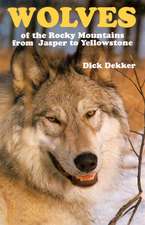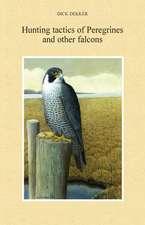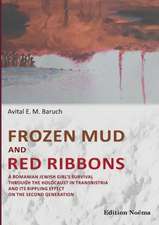Stories of Predation (Colour): 60 Years of Watching Wildlife
Autor Dick Dekker PhDen Limba Engleză Hardback – 27 feb 2022
Preț: 249.29 lei
Preț vechi: 282.90 lei
-12% Nou
Puncte Express: 374
Preț estimativ în valută:
47.70€ • 49.71$ • 39.50£
47.70€ • 49.71$ • 39.50£
Carte disponibilă
Livrare economică 13-27 martie
Preluare comenzi: 021 569.72.76
Specificații
ISBN-13: 9780888394385
ISBN-10: 0888394381
Pagini: 240
Ilustrații: illus/photos 40
Dimensiuni: 140 x 216 x 21 mm
Greutate: 0.61 kg
Editura: Hancock House Ltd
Colecția Hancock House Publishers (CA)
ISBN-10: 0888394381
Pagini: 240
Ilustrații: illus/photos 40
Dimensiuni: 140 x 216 x 21 mm
Greutate: 0.61 kg
Editura: Hancock House Ltd
Colecția Hancock House Publishers (CA)
Recenzii
Dick Dekker provides the reader, be they a naturalist or professional biologist, with an invaluable memoir of a lifetime watching predators in the wild. In a series of vignettes, Dekker shares his adventures, academic insights and opinions into two iconic predators the Peregrine Falcon and Grey Wolf. These are the joys and rewards of patient observations throughout western Canada, and he teaches us that fear of predators leaves a fingerprint on the behaviors of the prey. The stories will inspire the reader to take a pause, find a good vantage spot, and sit quietly by the shore and let the birds come to you." -- Dr. Mark Drever, University of British Columbia
This book is a tremendous contribution to the biology and historical changes of wildlife in Canada. Few biologists have been as dedicated to field studies as is the case with Dick Dekker. He has been a critical thinker, and followed through, by taking the time to write about it. A book well worth having on a bookshelf for anyone interested in wildlife." -- Dr. Lu Carbyn, Retired Research Scientist, Canadian Wildlife Service Adjunct Professor, University of Alberta
Dick Dekker has had a long career as a naturalist, independent researcher, and educator. In this memoir, which is an interesting mix of personal story comingled with natural and human history, he has chronicled his experiences and observations acquired over 60 years while immersed in and interacting with the vibrant and challenging natural reality of a very special place. This special place is the Rocky Mountains of Alberta, where Dr. Dekker introduces us to the lives and interactions of many of the predators and prey that inhabit this wild place, along with a history of some of the concurrent influences and impacts affected by human residence and activity in the region. I thoroughly enjoyed reading this readily accessible and entertaining addition to the long-established discipline of natural history writing." -- Robert Hoffman, Ecologist (retired)
Dick Dekker is a remarkable individual, and Stories of Predation is a remarkable book. The tagline, "60 Years of Watching Wildlife," gives away the fact that this is actually an autobiography, summarizing Dekker's accomplishments over the years. On page 209, he can't resist letting us know that this was his original choice for the title. Still, the book is indeed about predators, mostly, and there are plenty of well-told stories here about wolves, falcons, and eagles. But the book also contains tales of shorebirds, ungulates, forests, and water levels, and on another level, it chronicles Dekker's opinions on various aspects of park management (and mismanagement), conservation, life in the backcountry, and life as a Dutch immigrant to Canada. It is important to realize that in many ways, Dick Dekker's perspective is singular. He is not a university academic, although he now holds a PhD, and his publication record looks a lot like one of theirs. Likewise, he is not a government biologist, or a typical environmental journalist. Instead, Dekker describes himself as an independent naturalist. In a world where most biological studies take place over one or two "field seasons," Dick Dekker's datasets were amassed over decades. Whereas most biologists frame their studies in terms of "hypothesis testing," Dekker is relentlessly inductive, mulling over thousands of observations before suggesting a general explanation for what he has seen. Even among birders and weekend naturalists, Dekker's observational record stands out prominently. For this reason, Stories of Predation should be right there on the bookshelf of anyone interested in the natural history of Western Canada, be they professional or amateur. Recognizing the importance of diverse perspectives on all environmental issues, a voice as unique and powerful as Dick Dekker's deserves to be heard, and this book will ensure his legacy as a truly insightful naturalist." -- John Acorn, Naturalist and Research Associate at the Royal Tyrrell Museum of Paleontology
This book is a tremendous contribution to the biology and historical changes of wildlife in Canada. Few biologists have been as dedicated to field studies as is the case with Dick Dekker. He has been a critical thinker, and followed through, by taking the time to write about it. A book well worth having on a bookshelf for anyone interested in wildlife." -- Dr. Lu Carbyn, Retired Research Scientist, Canadian Wildlife Service Adjunct Professor, University of Alberta
Dick Dekker has had a long career as a naturalist, independent researcher, and educator. In this memoir, which is an interesting mix of personal story comingled with natural and human history, he has chronicled his experiences and observations acquired over 60 years while immersed in and interacting with the vibrant and challenging natural reality of a very special place. This special place is the Rocky Mountains of Alberta, where Dr. Dekker introduces us to the lives and interactions of many of the predators and prey that inhabit this wild place, along with a history of some of the concurrent influences and impacts affected by human residence and activity in the region. I thoroughly enjoyed reading this readily accessible and entertaining addition to the long-established discipline of natural history writing." -- Robert Hoffman, Ecologist (retired)
Dick Dekker is a remarkable individual, and Stories of Predation is a remarkable book. The tagline, "60 Years of Watching Wildlife," gives away the fact that this is actually an autobiography, summarizing Dekker's accomplishments over the years. On page 209, he can't resist letting us know that this was his original choice for the title. Still, the book is indeed about predators, mostly, and there are plenty of well-told stories here about wolves, falcons, and eagles. But the book also contains tales of shorebirds, ungulates, forests, and water levels, and on another level, it chronicles Dekker's opinions on various aspects of park management (and mismanagement), conservation, life in the backcountry, and life as a Dutch immigrant to Canada. It is important to realize that in many ways, Dick Dekker's perspective is singular. He is not a university academic, although he now holds a PhD, and his publication record looks a lot like one of theirs. Likewise, he is not a government biologist, or a typical environmental journalist. Instead, Dekker describes himself as an independent naturalist. In a world where most biological studies take place over one or two "field seasons," Dick Dekker's datasets were amassed over decades. Whereas most biologists frame their studies in terms of "hypothesis testing," Dekker is relentlessly inductive, mulling over thousands of observations before suggesting a general explanation for what he has seen. Even among birders and weekend naturalists, Dekker's observational record stands out prominently. For this reason, Stories of Predation should be right there on the bookshelf of anyone interested in the natural history of Western Canada, be they professional or amateur. Recognizing the importance of diverse perspectives on all environmental issues, a voice as unique and powerful as Dick Dekker's deserves to be heard, and this book will ensure his legacy as a truly insightful naturalist." -- John Acorn, Naturalist and Research Associate at the Royal Tyrrell Museum of Paleontology

















